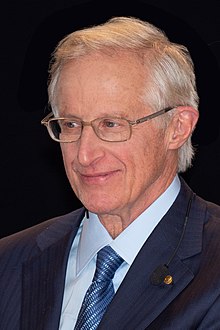William Nordhaus
American economist
William Nordhaus (born May 31, 1941) is an American economist, the Sterling Professor of Economics at Yale University, and a co-recipient of the 2018 Nobel Memorial Prize in Economic Sciences. He is best known for his work in economic modelling of the impacts from climate change.

| This economist article is a stub. You can help out with Wikiquote by expanding it! |
Quotes
edit- Carbon prices must be raised to transmit the social costs of GHG emissions to the everyday decisions of billions of firms and people.
- A Question of Balance: Weighing the Options on Global Warming Policies (2008), p. 168
- We have to be grown-ups, I think [when discussing the payment of funds today to prevent climate harm which may be decades in the future]. There are lots of things we do where the investments come way, way in the future. Educating 4-year-olds . . . that's an investment that goes way into the future as well.
- "Economist Says Best Climate Fix A Tough Sell, But Worth It." National Public Radio. February 11, 2014.
- Putting a low price on valuable environmental resources is a phenomenon that pervades modern society. Agricultural water is not scarce in California; it is underpriced. Flights are stacked up on runways because takeoffs and landings are underpriced. People wait for hours in traffic jams because road use is unpriced. People die premature deaths from small sulfur particles in the air because air pollution is underpriced. And the most perilous of all environmental problems, climate change, is taking place because virtually every country puts a price of zero on carbon dioxide emissions.
- "The Pope & the Market," The New York Review of Books, October 8, 2015
- My own view is that there basically is no alternative to a market solution. The reason is, if you look around, who are we talking about that’s going to solve the problem: it’s you and me. There are billions of individuals, millions of firms, thousands of governments, hundreds of nations, and for them to take action, they’re going to have to have incentives. The kind of incentives we’re talking about; they’re not speeches - we can sermonize all day - but the incentives of market prices. [This requires us to] raise the prices of goods and services that are carbon intensive, and to lower the ones that are less carbon intensive.
- Yale University Press Conference Introducing Nobel Laureate William Nordhaus. (YouTube video). Associated Press. October 8, 2018.
- When I talk to people about how to design a carbon price, I think the model is British Columbia. You raise electricity prices by $100 a year, but then the government gives back a dividend that lowers internet prices by $100 year. In real terms, you’re raising the price of carbon goods but lowering the prices of non-carbon-intensive goods.
Economics
editQuotes about Nordhaus
edit- In the mid-1990s, [Nordhaus] became the first person to create an integrated assessment model, i.e. a quantitative model that describes the global interplay between the economy and the climate. His model integrates theories and empirical results from physics, chemistry and economics. Nordhaus’ model is now widely spread and is used to simulate how the economy and the climate co-evolve.
- Press release announcing the two winners of the Nobel Memorial Prize in Economics for 2018 Royal Swedish Academy of Sciences. October 8, 2018.